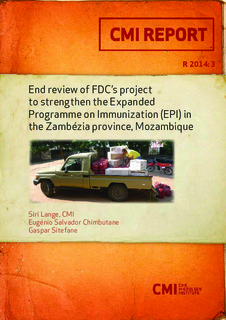End review of FDC’s project to strengthen the Expanded Programme on Immunization (EPI) in the Zambézia province, Mozambique
Research report
Permanent lenke
http://hdl.handle.net/11250/2475152Utgivelsesdato
2014-09-01Metadata
Vis full innførselSamlinger
- Publications [1488]
Originalversjon
Bergen: Chr. Michelsen Institute (CMI Report R 2014:03) 59 p.Sammendrag
This report is an end review of Fundação para o Desenvolvimento da Comunidade (FDC)’s project to support the implementation of the Expanded Programme on Immunization (EPI) in the Zambézia province. The purposes of the project were the following:
to improve the system of distribution and conservation of vaccines in health units to promote the use of gas as an alternative to kerosene and firewood to improve access to sources of environmentally friendly energy by communities
The Royal Norwegian Embassy in Maputo (RNE) funded the project, which had total budget of NOK 15.5 million (approximately USD 2.7 million), and the project was implemented in the period 2010 to 2013. Overlapping with this project period, other donors have funded (and are funding) the province’s health sector with more than USD 77 million, but there has been no or limited coordination between the projects. The team concludes that while the reviewed project has greatly contributed to improving the cold chain in the province, the energy source that was introduced through the project to secure the cold chain - gas - has proved very expensive, unreliable when organized by the province authorities, and with poor prospects for sustainability. Only two years after the gasfridges were donated by the project, they are in the process of being replaced with solar fridges by another donor. Health workers express a strong preference for solar equipment. Approximately one third of the FDC project funds were spent on infrastructure for the privately owned company VidaGas to enable this company to supply gas to the gas fridges and lamps introduced by the project and to the local population. Since the gas fridges are now being replaced, and since the local population has not adopted gas for cooking, there is the danger that this investment has long term benefits for the company only, and not for the health sector. FDC owns one third of the gas company and was there
